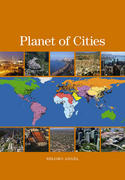Professor Shlomo Angel's new book, Planet of Cities, seems likely to command a place on the authoritative bookshelf of urbanization between Tertius Chandler's Four Thousand Years of Urban Growthand Sir Peter Hall's Cities and Civilization and The Containment of Urban England. Chandler produced the definitive volume of gross population figures for urban areas (cities) over millennia. Angel, takes the subject much further, describing detail how urban areas have grown over the last two centuries, both in population and continuous urban land area. The book focuses principally on population growth, urban spatial expanse, and density. read more »
Policy
Where Do You Live?
I recently moved to Providence, Rhode Island, where I live in the town of West Warwick. I’ve been learning the place more and soaking in New England culture (and seafood). This area has a Rust Belt type profile: declining population, post-industrial economic landscape, high unemployment, etc. So I’ve been trying to get a handle on conditions and think a bit about what the opportunities are. read more »
Here's Why People Don't Think We're in a Recovery
The most recent jobs report was again below consensus. With fewer than 100,000 new jobs, unemployment fell only because people continue to leave the labor force in huge numbers. People are discouraged, and many don't believe we are in a recovery. Why would they think that we aren't in a recovery? After all, GDP is above its pre-recession high, and we hear all the time about how many jobs have been created over the past couple of years. read more »
What to Look For in the Nordic Model
The Nordic nations, and Sweden in particular, are seen by many as the proof that it is possible to combine innovative and entrepreneurial economies with high tax rates. It is often argued that nations such as the US can gain the attractive social features of Denmark, Sweden, Norway and Finland — such as low crime rates, high life expectancy, and a high degree of social cohesion — simply by expanding the welfare state. An in depth analysis, however, shows that this line of reasoning is flawed. read more »
Rethinking Brand Chicago
So many Midwest places flail around looking for a brand image or identity. Not Chicago. In fact, the identity and stories of Chicago overflow the page. They are too numerous to be written in a mere blog posting.
Yet Chicago has in effect decided to jettison that powerful, historic brand identity in favor of a type of global city genericism. This, I believe, is a mistake.
One trend you can’t help but notice if you travel is the increasing homogenization of the urban culture and standard of urban development. Global markets demand standardized commodities that can be graded and traded. This includes cities. This forces cities increasingly into a standard model of what one expects. read more »
The End of the Road for Eds and Meds
In the last few decades, as suburbanization and deindustrialization devastated so many cities, they turned to two sectors that seemed not only immune to decline, but were actually growing: universities and hospitals. The so-called “eds and meds” sectors, often related through university affiliated hospitals, became a great stabilizer for many places. read more »
Carmel, IN Named Best Small City in America to Live In But Can Others Follow?
Money Magazine just named the Indianapolis suburb of Carmel as the top small city in America to live in. Fishers, another Indianapolis suburb, ranked #12. read more »
Obama Fuel Economy Rules Trump Smart Growth
The Environmental Protection Agency (EPA) has just finalized its regulation requiring that new cars and light trucks (light vehicles) achieve average fuel efficiency of 54.5 miles per gallon (MPG) by 2025 (4.3 liters per 100 kilometers). This increase in the "CAFE" standard (Corporate Average Fuel Efficiency) is the second major step in the Obama Administration's program to improve light vehicle fuel efficiency. In 2010, EPA adopted regulations requiring 35.5 MPG average by 2016 (6.6 liters per 100 kilometers). read more »
The Creative Destruction of Creative Class-ification
Bits and pieces of ideal cities have been incorporated into real ones; traffic projects and housing schemes are habitually introduced by their sponsors as at least preliminary steps to paradise. The ideal city gives us the authority to castigate the real one; while the sore itch of real cities goads us into creating ideal ones. Jonathan Raban, from Soft City
There’s a spot in Cleveland that is becoming what many had hoped for: a bit vibrant, a bit hip, with breweries, local retail, and farm-to-table restaurants turning that hard rawness of a disinvested Rust Belt city strip into a thing less raw. read more »
Travel Bans: Do No-Go Lists Fight Freedom?
Had the 1789 constitutional amendments protected travel alongside the rights to freedom of the press, religion, and assembly, the United States might be a less xenophobic country. It might be less prone to treat arriving tourists as terror suspects, and more encouraging to those of its own citizens who want to explore the world’s darker corners. Instead, foreign travel in the age of terror feels more like an imperial favor than a constitutional right. read more »






















